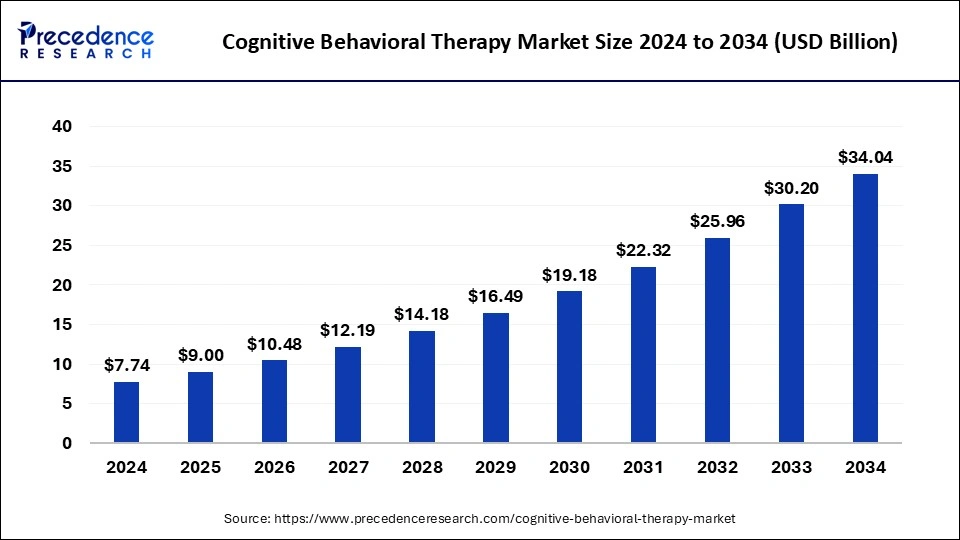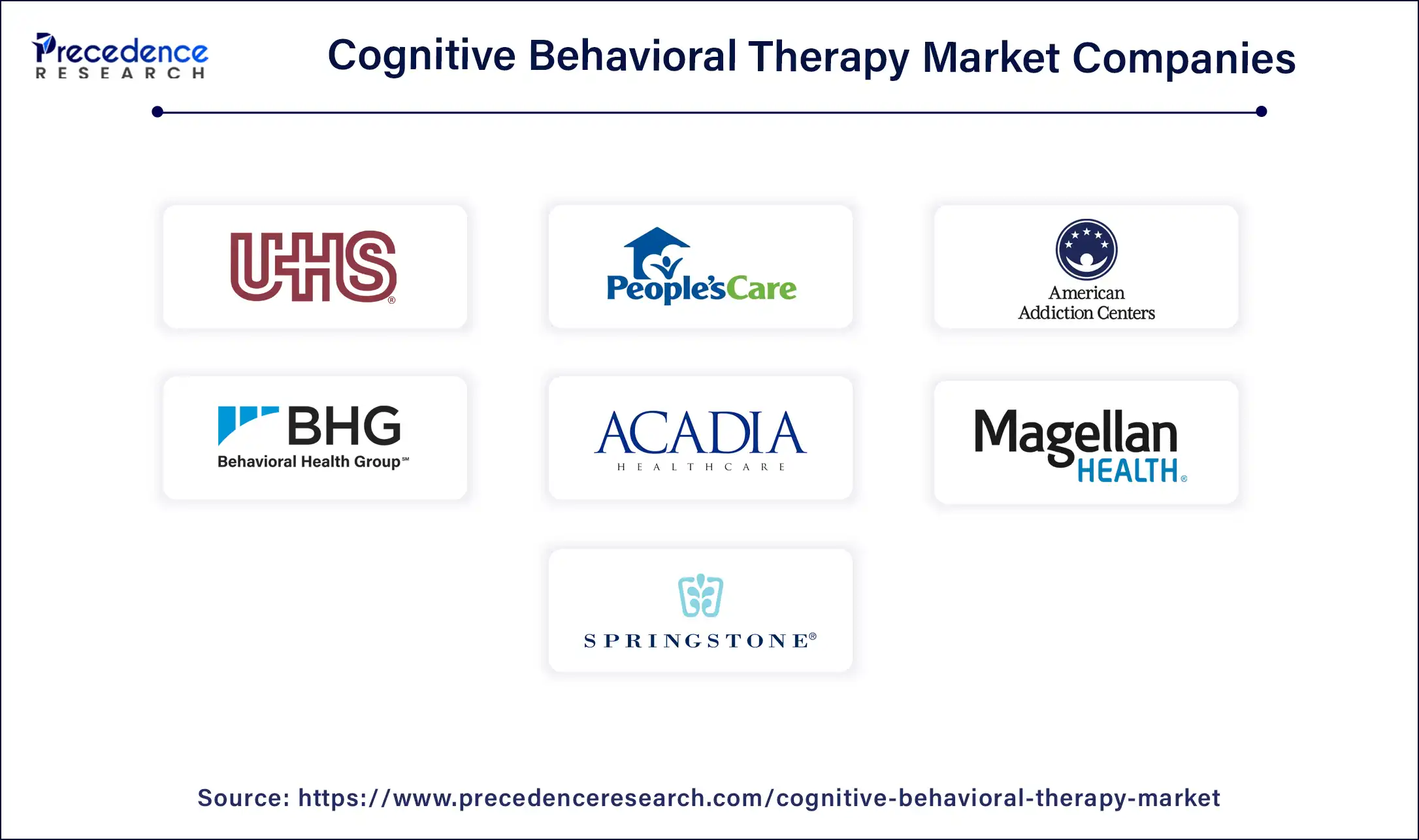January 2025
The global cognitive behavioral therapy market size is calculated at USD 9.00 billion in 2025 and is forecasted to reach around USD 34.04 billion by 2034, accelerating at a CAGR of 15.96% from 2025 to 2034. The market sizing and forecasts are revenue-based (USD Million/Billion), with 2024 as the base year.
The global cognitive behavioral therapy market size was estimated at USD 7.74 billion in 2024 and is predicted to increase from USD 9.00 billion in 2025 to approximately USD 34.04 billion by 2034, expanding at a CAGR of 15.96% from 2025 to 2034. The cognitive behavioral therapy market is driven by the growing understanding of mental health problems and how well CBT works to address them.

A type of psychotherapy called cognitive behavioral therapy (CBT) focuses on how your attitudes, ideas, and beliefs influence your emotions and behavior. CBT aims to teach you useful coping mechanisms for handling various life's challenges. One of the main principles of cognitive behavioral therapy (CBT) is that although thinking unrealistically and less negative causes unhappiness and bad behaviors, realistic thinking enables people to deal with difficult situations. To assist people in recognizing and challenging unhelpful ideas and actions, cognitive behavioral therapy (CBT) investigates the relationships between ideas, actions, and emotions. With this therapy, patients can concentrate on their problems and create workable plans to deal with them.
Cognitive Behavioral Therapy Market Data and Statistics
| Report Coverage | Details |
| Market Size by 2034 | USD 34.04 Billion |
| Market Size in 2025 | USD 9.00 Billion |
| Growth Rate from 2025 to 2034 | CAGR of 15.96% |
| Largest Market | North America |
| Base Year | 2024 |
| Forecast Period | 2025 to 2034 |
| Segments Covered | Type, Indications, Age Group, Service Provider, and Regions |
| Regions Covered | North America, Europe, Asia-Pacific, Latin America, and Middle East & Africa |
Rising prevalence of mental health disorders
CBT has been thoroughly investigated and shown to be beneficial in the treatment of several mental health conditions. Longitudinal studies and clinical trials repeatedly demonstrate how CBT methods assist people in managing their symptoms, creating coping strategies, and enhancing their general quality of life. The implementation of this evidence-based strategy has been accelerated by the endorsement it has received from legislators, insurers, and healthcare professionals. This drives the growth of the cognitive behavioral therapy market.
Integration with digital health solutions
Digital health technologies make tracking patient participation and progress easier in real time. In addition to monitoring symptom severity and tracking patients who are at risk of relapsing, therapists can also receive automatic warnings regarding these individuals. This ongoing feedback loop makes it possible to promptly modify treatment plans, guaranteeing the best possible outcomes for patients. Due to the lower overhead associated with digital health solutions, providing CBT can be done more affordably than in traditional therapy settings. This can maximize the use of resources within healthcare systems and reduce the cost barriers to receiving mental health care.
Shortage of trained professionals
Due to CBT's demonstrated efficacy in treating a range of mental health issues, including substance misuse, depression, PTSD, and anxiety disorders, there is an increasing demand for this therapy. There is, nevertheless, a shortage of certified CBT therapists. Many people who potentially benefit from CBT are either faced with lengthy wait times or have limited access to licensed therapists due to this supply-demand gap. Burnout and retention can be serious problems, even in the presence of qualified specialists. Providing therapy may be quite stressful, especially when dealing with complicated mental health concerns. This can result in therapist burnout. This can lower the effective workforce available to give CBT, especially when combined with other issues like high caseloads and emotional strain.
Adapting CBT techniques to different cultural contexts and languages
Every culture views mental health, sickness, and therapy from a different perspective. Understanding and incorporating these cultural quirks into therapy sessions is part of adapting CBT. For example, how people view and seek treatment for mental health concerns is influenced by family relationships, religious beliefs, and traditional values. Therapists who can effectively navigate cultural differences have a higher chance of being trusted and accepted by their communities, which in turn leads to increased therapy involvement and a rise in demand. This opens an opportunity for the cognitive behavioral therapy market.
The cognitive therapy segment dominated in the cognitive behavioral therapy market in 2024. One of the psychotherapies studied and shown to be most effective is cognitive therapy. Its effectiveness in treating illnesses like depression, anxiety disorders, PTSD, and obsessive-compulsive disorder (OCD) has been demonstrated by several research. Patients and healthcare professionals accept it more because of its solid factual backing. Many different types of mental health conditions can be treated with cognitive therapy methods and concepts. Because of its adaptability, it can be customized to meet the demands of each patient, which is why therapists love it.
Numerous apps and online cognitive therapy programs have been developed in response to the growing popularity of digital health. These platforms have made cognitive treatment more widely available, particularly where mental health practitioners are scarce. Teletherapy has become more popular since the COVID-19 epidemic, and cognitive therapy is especially useful for virtual sessions.
The depression segment dominated the cognitive behavioral therapy market in 2024. One of the most prevalent mental health conditions in the world is depression. The World Health Organization (WHO) estimates that depression affects over 264 million people worldwide, regardless of age. Because depression is so common, there is a greater need for efficient treatments, which propels the market for cognitive behavioral therapy. The significance of obtaining treatment for mental health concerns has gained more attention and acceptability. A growing number of people are seeking therapy for depression because of public health campaigns, destigmatization initiatives, and improved mental health education. The need for CBT services has increased due to this change.
The adults segment dominated in the cognitive behavioral therapy market in 2024. Adults with mental health disorders, such as depression, anxiety, and stress-related illnesses, are disproportionately affected. Over 264 million people of all ages suffer from depression, which is the world's biggest cause of disability, according to the World Health Organization (WHO). The stigma associated with receiving mental health therapy has decreased and acceptance of it has grown. The advantages of therapy have been emphasized by awareness campaigns and public education, encouraging more adults to get treatment.
Evidence from many clinical studies supports CBT's efficacy in treating various mental health issues. CBT is a recommended treatment choice for adults since studies have demonstrated that it can considerably improve symptoms of anxiety, depression, PTSD, and other illnesses.
The hospitals & clinics segment dominated in the cognitive behavioral therapy market in 2024. Despite providing an integrated approach to therapy that incorporates CBT as part of a more comprehensive mental health care plan, hospitals and clinics also offer comprehensive healthcare services. Coordinated care, combining CBT with other therapies, physical health services, and pharmaceutical management, benefits patients. Because of their comprehensive approach, hospitals and clinics are chosen for CBT because they improve patient outcomes. While CBT is a component of a comprehensive approach to mental health therapy, many hospitals and clinics offer integrated mental health services. This integration involves working together across multiple disciplines, including primary care, neurology, and psychiatry, to give patients with complicated requirements a smooth treatment experience. Such a coordinated strategy supports and enhances CBT's dominance in these situations.
The rehabilitation centers segment shows a significant growth in the cognitive behavioral therapy market during the forecast period. The increased prevalence of mental health conditions like PTSD, anxiety, depression, and substance misuse is driving the need for efficient treatment alternatives. Rehab facilities are becoming increasingly important for offering all-encompassing care, with CBT frequently serving as a key component. Better patient results result from rigorous and regular CBT therapies made possible by the structured setting of rehabilitation clinics. Social perceptions of mental health are changing, with more people becoming aware of the issue and the stigma attached to getting help lessening.
This shift incentivizes more people to seek assistance, frequently from rehabilitation facilities that provide all-inclusive care plans that include CBT. The necessity of mental health treatment is emphasized by public health campaigns and education programs, which increases demand for the services offered by rehab clinics.
North America dominated in the cognitive behavioral therapy market in 2024. The area is a center for substantial mental health research and development. Universities, research centers, and commercial businesses in North America are always developing new approaches and improving CBT procedures, which helps these therapies advance and succeed. Prominent psychological and mental health research institutions, including Harvard University, Stanford University, and the University of Toronto, have substantially contributed to CBT methods and methodologies.
Asia- Pacific is observed to be the fastest growing in the cognitive behavioral therapy market during the forecast period. The healthcare system is developing and growing quickly in many Asia-Pacific nations. Governments are spending money on medical buildings, hiring and educating mental health specialists, and adding mental health services to general care. This improved infrastructure helps make CBT more widely available and accepted. Numerous local governments are implementing laws and initiatives to enhance mental health services. The CBT market is expanding due to programs including public health insurance systems, financing for mental health treatments, and national mental health plans.

By Type
By Indications
By Age Group
By Service Provider
By Geography
For inquiries regarding discounts, bulk purchases, or customization requests, please contact us at sales@precedenceresearch.com
No cookie-cutter, only authentic analysis – take the 1st step to become a Precedence Research client
January 2025
January 2025
January 2025
March 2025